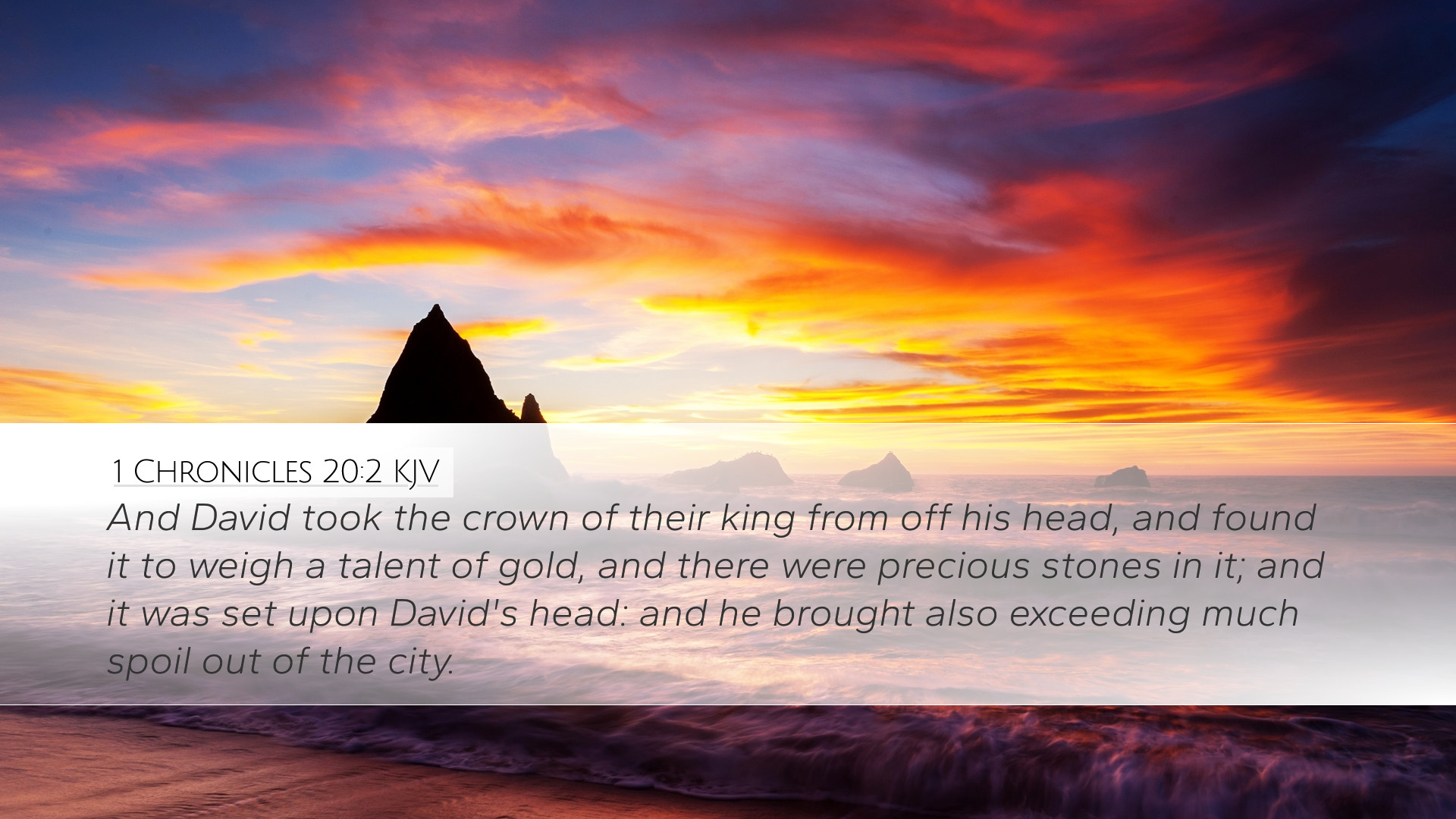Commentary on 1 Chronicles 20:2
1 Chronicles 20:2 states: "And David took the crown of their king from his head, and found it to weigh a talent of gold, and there were precious stones in it; and it was set upon David's head: and he brought also exceeding much spoil out of the city."
Introduction
This verse encapsulates a significant moment in David's reign, showcasing God's faithfulness in deliverance, the weight of leadership, and the symbolic nature of crowns and victory. The insights derived from public domain commentaries—such as those by Matthew Henry, Albert Barnes, and Adam Clarke—provide a rich tapestry of understanding for pastors, theology students, and scholars alike.
The Significance of the Crown
The act of taking the crown of the Ammonite king serves both political and spiritual purposes. As noted by Matthew Henry, "the crown is emblematic of power and authority." It signifies not only the acquisition of victory over the Ammonites but also the legitimization of David's kingship over Israel. Furthermore, Albert Barnes emphasizes that this crown carried significant material value, as it was composed of gold and adorned with precious stones, symbolizing the tangible rewards of God's providence in David's life.
Weight and Responsibility
The weight of the crown—measured as a talent of gold—reflects the heavy burden borne by leaders. Adam Clarke points out that a talent is an ancient measure that represented a substantial amount, almost indicative of the many responsibilities David would carry as king. Like the crown, leadership requires not merely the ability to reign but an acceptance of the moral and spiritual implications of authority.
Divine Victory and Spoils of War
The mention of "exceeding much spoil out of the city" pertains to the divine victory granted to David. The spoils symbolize God's promise to His people, as victory in battle was often interpreted as a sign of divine favor. Matthew Henry remarks that these spoils serve as a reminder of God's provision for His people, showcasing how He rewards His faithful servants.
Spiritual Implications
Moreover, the idea of spoils extends beyond material wealth. Albert Barnes suggests a dual interpretation; these spoils also encompass spiritual victories won over sin, temptation, and the challenges faced in faithful living. The narrative signifies that with following God comes the assurance of conquest—not only in battles with nations but also in personal struggles.
The Role of Leadership in Adversity
David's victory over the Ammonites reminds leaders within the church that times of adversity can lead to remarkable triumphs, provided they rest in God's strength and guidance. Adam Clarke emphasizes that true leaders, like David, must rely on God and endure the hardships in pursuit of righteousness. The narrative acts as an exhortation to pastors and theologians to remind their congregations that they are not alone in their spiritual battles.
The Crown of Glory
Ultimately, the physical crown taken from the Ammonite king serves as a prelude to a greater theological truth. Matthew Henry reflects that while earthly crowns may fade away, there exists a crown of glory, promised to those who are faithful in their service to God. This reinforces the message, particularly for leaders, that the true reward lies in heavenly places where God bestows eternal significance.
Insights for Today’s Ministry
For contemporary pastors and theologians, this verse serves as a powerful reminder of divine assurance and the weight of service in ministry. The various dimensions of victory, responsibility, and eternal reward outlined in public domain commentaries aid in understanding how this historical narrative shepherds our modern faith walk.
Conclusion
In summary, 1 Chronicles 20:2 is not merely a recount of historical events but a vivid reminder of God’s overarching sovereignty, the complexities of leadership, and the blessings that arise from faithfulness. AsDavid took the Ammonite crown, he also acknowledged the Lord's hand in his victories, a template for leaders today, encouraging them to seek God earnestly for triumph in their ministries and lives.


